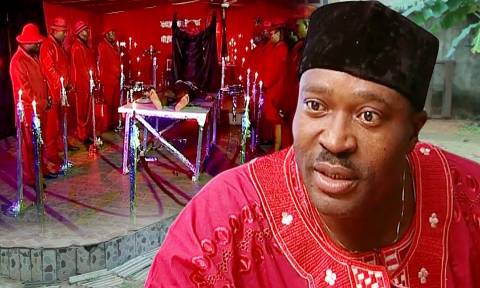The next generation of Nigerian film makers will surely surpass the efforts of the current crop of Nollywood practitioners and will proudly take their rightful place alongside their counterparts from recognised film-making countries, America, India, Burkina Faso, and South Africa included. The most obvious reason for this informed prediction is that this new generation of Nigerian film makers will be better equipped to function in the medium because of their specialist training.
Nollywood is a classic example of the sarcastic irony implied in a song by Kio Amachree titled ‘Any Dummy Can Play Guitar.’ This song, released in the eighties, is also a commentary on the Nigerian situation in which professions are infiltrated and virtually saturated with all manner of charlatans, who by virtue of their financial success are automatically equated as successful experts. Simply put, Nollywood is a trade, not an art!
The new crop
Among the talents currently ‘underground’ and unknown are the following: Chinedu Iregbu, Mildred Ayendeng, Idhebor Kagho, Adaobi Obiegbosi, Akpor Kagho, Hafeez Adeyemi, Osegba Abdullahi, Rahila Abubakar, Gbenga Soyinka, Nannak Ndam, Uwemimo Ekpewo, Effiong Daniel, Ladi Dogonyaro, Usho Baba, Austin Itshore, Saaka Victor, Janet Sambo, Esther Tujegbe, and Dike Okeh.
However, it is from the above list that the new generation of genuine Nigerian film makers will emerge. More importantly, they will be armed with the essential tools with which to change the face of the Nigerian film industry for the better. For now, they are among the fresh graduates and advanced students of the National Film Institute, NFI, Jos; which is the academic arm of the Nigerian Film Corporation, NFC, also based in Jos.
These future filmmakers ultimately earn degrees and diplomas in film making, awarded by the University of Jos, to which the NFI is affiliated. What is so heartening and reassuring for Nigeria, is the fact that the NFI Jos is patterned after well-established film schools like the London Film School, British Film Institute, Swedish Film Institute, and the film departments of the San Francisco Art Institute and the University of Southern California, Los Angeles.
The bottom line in all these schools is that all the students are given hands-on training as well as theory courses in all aspects of film-making. They actually get to make films as students and these are accessed by external experts and juried for international student film festivals.
Trained and untrained
I recall, with amusement, my days in the Nigerian Television Authority, Lagos, as a consultant in the mid-eighties. The trend then was to employ graduates with Mass Communications degrees from Nigerian universities. Incredibly, unlike their counterparts produced by American universities, these Nigerian graduates were never privileged to have had any experience working on the television and radio stations of their universities. Nigerian universities offering Mass Communications courses had no television or radio stations then, and so offered just theoretical training.
It was hilarious watching these fresh graduates now producer/directors, working on set. I suppose to them it was the ultimate mark of authority to shout instructions like, “cameraman, give me a close-up, cameraman give me a low shot.” The poor cameramen most times ignored them and took the shots they thought were most appropriate.
The cameramen and other technicians were usually members of staff who had risen up the ranks, and although they had been trained on the job, they were subservient in rank and salary structure to the fresh graduates. This explains why for a very long time, apart from news programmes, NTA was never able to produce good documentary or drama programmes.
For a long time, Nollywood duplicated this production pattern in that the only trained members of the crew were mostly the cameramen, soundmen, and editors who actually ‘rescued’ the technical disasters that were churned out as home videos or Nigerian movies.
What the NFI Jos is thankfully trying to impress upon the film industry in Nigeria are the facts that film-making is a collective team-collaboration and, all members of the team must be well-trained to achieve a professional end-result.
Thus, a cameraman, scriptwriter, soundman, editor, and others are all graduates who have majored in specific areas of film making. Predictably, this ensures mutual respect and even inputs on set.
The right thing
It is within this framework that the importance of the NFI within the Nigerian film industry is better appreciated. Although there are now more than 40 Nigerian higher institutions offering Mass Communications training, very few have radio stations and, nearly all don’t have TV stations and newspapers for practical training.
We recently witnessed the highly publicised and absurd situation in which a supposed affiliate of a New York Film School trained some Niger Delta youth in filmmaking, in the space of a month!
It is when we get the right mix of well-trained film-makers and theatre-arts-trained actors and actresses that the Nigerian film industry will finally come of age. It is not about money, as Nollywood-lovers are bound to proudly point out. It is not quite about the technical divide between cinematographers and videographers. It is simply about doing the right thing well.
The right thing is that Nigeria now has a functional National Film Institute and the Nigerian Film Corporation, is for a change, headed by a trained and experienced film-maker in the person of Afolabi Adesanya. It is this combination, with a little help from professional friends, that will ensure that sooner than later, the next generation of real film makers will emerge in Nigeria to reclaim and advance an industry which was lovingly pioneered by the first generation of trained Nigerian film-makers in the early seventies.
It will not be easy for the new generation. As one of the NFI students pondered, “Will Nigerian home video watchers recognise our better films, having been so used to Nollywood films?”
Will these new generation filmmakers get funding away from the Onitsha-Lagos cabal of trader-promoters who will want to keep Nollywood stagnant in technical creativity and theme-direction just because it is now a reliable cash cow? New money and new talent must come together to steer the Nigerian film industry into a brighter future.



















